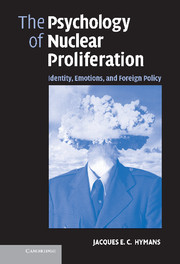Book contents
- Frontmatter
- Contents
- List of figures
- List of tables
- Preface
- List of acronyms and abbreviations
- 1 Introduction: life in a nuclear-capable crowd
- 2 Leaders' national identity conceptions and nuclear choices
- 3 Measuring leaders' national identity conceptions
- 4 The struggle over the bomb in the French Fourth Republic
- 5 Australia's search for security: nuclear umbrella, armament, or abolition?
- 6 Argentina's nuclear ambition – and restraint
- 7 “We have a big bomb now”: India's nuclear U-turn
- 8 Conclusion: lessons for policy
- Appendix: Coding rules and results
- Bibliography
- Name index
- Subject index
3 - Measuring leaders' national identity conceptions
Published online by Cambridge University Press: 22 September 2009
- Frontmatter
- Contents
- List of figures
- List of tables
- Preface
- List of acronyms and abbreviations
- 1 Introduction: life in a nuclear-capable crowd
- 2 Leaders' national identity conceptions and nuclear choices
- 3 Measuring leaders' national identity conceptions
- 4 The struggle over the bomb in the French Fourth Republic
- 5 Australia's search for security: nuclear umbrella, armament, or abolition?
- 6 Argentina's nuclear ambition – and restraint
- 7 “We have a big bomb now”: India's nuclear U-turn
- 8 Conclusion: lessons for policy
- Appendix: Coding rules and results
- Bibliography
- Name index
- Subject index
Summary
Methodological considerations
Chapter 2 introduced the notion of leaders' national identity conceptions, or NICs, as the critical variable for understanding why some leaders choose to endow their states with nuclear weapons while others do not. But how can we measure leaders' NICs? The matter of measurement is a major stumbling block that the political science literature on identity is just beginning to tackle. This chapter presents my answer to the question of NIC measurement and then applies that answer to state leaders from the four country case studies of France, Australia, Argentina, and India. The reader should be advised that this is a relatively technical chapter, important for the purposes of social-scientific testing but not required for an adequate comprehension of the chapters that follow.
Operationalizing identity: concept streamlining
One of the primary difficulties for operationalizing identity is that it is often highly complex and capacious in its conceptualization. To deal with this problem, Chapter 2 presented a much more focused approach to identity as a variable. It claimed that we do not need to understand the national group's identity in all its complexity in order to explain nuclear policy decisions. Rather, we can focus on NICs, which are held by individual leaders – and indeed we can focus on a precise aspect of the NIC: how the leader understands the natural positioning of the nation with respect to its key comparison other(s).
- Type
- Chapter
- Information
- The Psychology of Nuclear ProliferationIdentity, Emotions and Foreign Policy, pp. 47 - 84Publisher: Cambridge University PressPrint publication year: 2006



